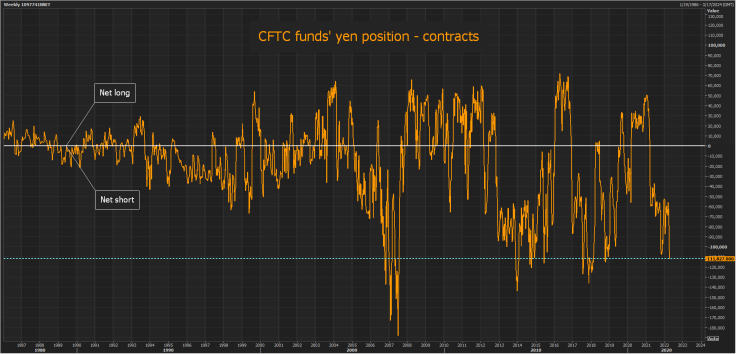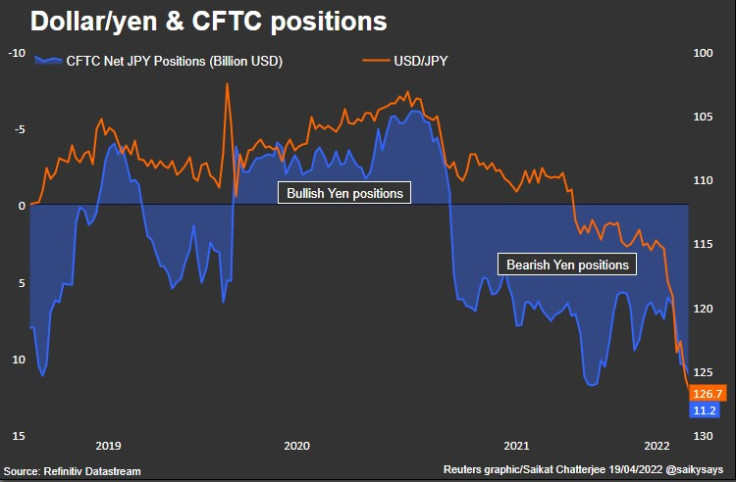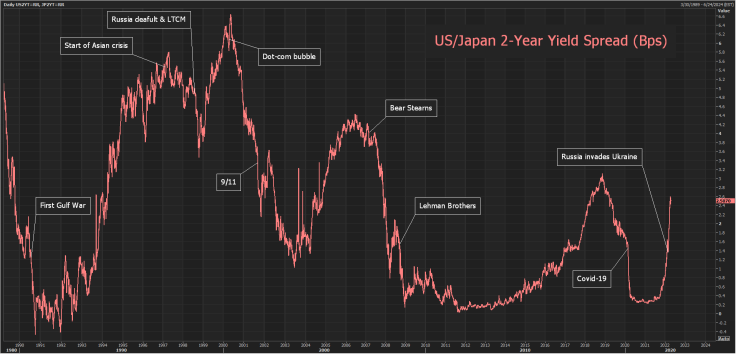Column-Hedge Funds' Bullish Dollar View Distorted By Yen Outlier: McGeever
Hedge funds remain bullish on the dollar, holding a net long dollar position in currency futures markets for more than nine months. But remove the Japanese yen from the equation, and the picture is much more blurred.
U.S. futures market data show that speculators trimmed the value of their overall long dollar position against a range of currencies for a second week, but increased their net short yen position to the largest in three and a half years.
Indeed, there are only a handful of periods since Commodity Futures Trading Commission (CFTC) yen futures contracts were launched in 1986 where funds have been more bearish on the Japanese currency than they are right now.
The latest CFTC data for the week ending April 12 show that funds increased their net short yen position to 111,827 contracts from the previous week's 103,829.
That is the biggest since October, 2018. As the following chart shows, it is approaching historic levels.
CFTC Funds' Yen Position

Dollar/Yen Vs CFTC Positions

The size of that bet against the yen in dollar terms is large, but not quite as extreme. It stands at $11.15 billion, the biggest since November last year and up from $10.5 billion the week before.
Buying dollars and selling yen has been the one FX trade that speculators have got spectacularly right this year, as the divergence between U.S. and Japanese interest rates and bond yields in the dollar's favor has exploded.
The Federal Reserve is in the early stages of what is shaping up to be the most aggressive inflation-busting cycle of interest rate rises since 1994. The Bank of Japan, meanwhile, is sticking with its massive stimulus program to support a fragile economic recovery.
US-Japan 2-Year Yield Spread

The dollar made a fresh 20-year high last week above 125.85 yen and on Monday it nudged 127.00 yen, lifting the broader dollar index to a two-year peak.
Japanese policymakers have voiced disquiet about the yen's decline. But it may require more than well-intentioned words to stop the rot.
"The prospects of a change in the yen's depreciation trend will ultimately be determined by U.S.-Japan monetary policy divergence and, hence, global inflation trends," Barclays analyst Shinichiro Kadota wrote on Monday. Selling pressure on the yen should persist in the near term, he added.
Hedge funds' stance on the dollar against other currencies, however, is much more mixed.
The latest CFTC data show that they trimmed their bets on a stronger dollar against a range of six major currencies, including the yen, to $13.22 billion from $14.136 billion. That reduction was mostly driven by the euro.
Funds increased their net long euro position by 11,690 contracts to 39,060 contracts, an aggregate bet worth $5.285 billion. That is funds' most bullish euro view in five weeks.
CFTC Dollar, Euro Positions

But it isn't paying off. The euro last week fell to a one-year low of $1.0756 after comments from European Central Bank (ECB) President Christine Lagarde were viewed as a sign that the ECB was in no rush to match the Fed in raising interest rates.
A growing number of analysts are now predicting that the euro could fall towards parity with the dollar in the months ahead. That's not something funds are positioning for.
Related columns:
Euro FX reserve demand returns after years of neglect (Reuters, April 13)
'Japanification' still lurks behind hawkish Fed frenzy (Reuters, March 29)
That rare crisis, when the yen falls (Reuters, March 15)
(The opinions expressed here are those of the author, a columnist for Reuters)
(By Jamie McGeever; Editing by Kenneth Maxwell)
© Copyright Thomson Reuters 2024. All rights reserved.




















